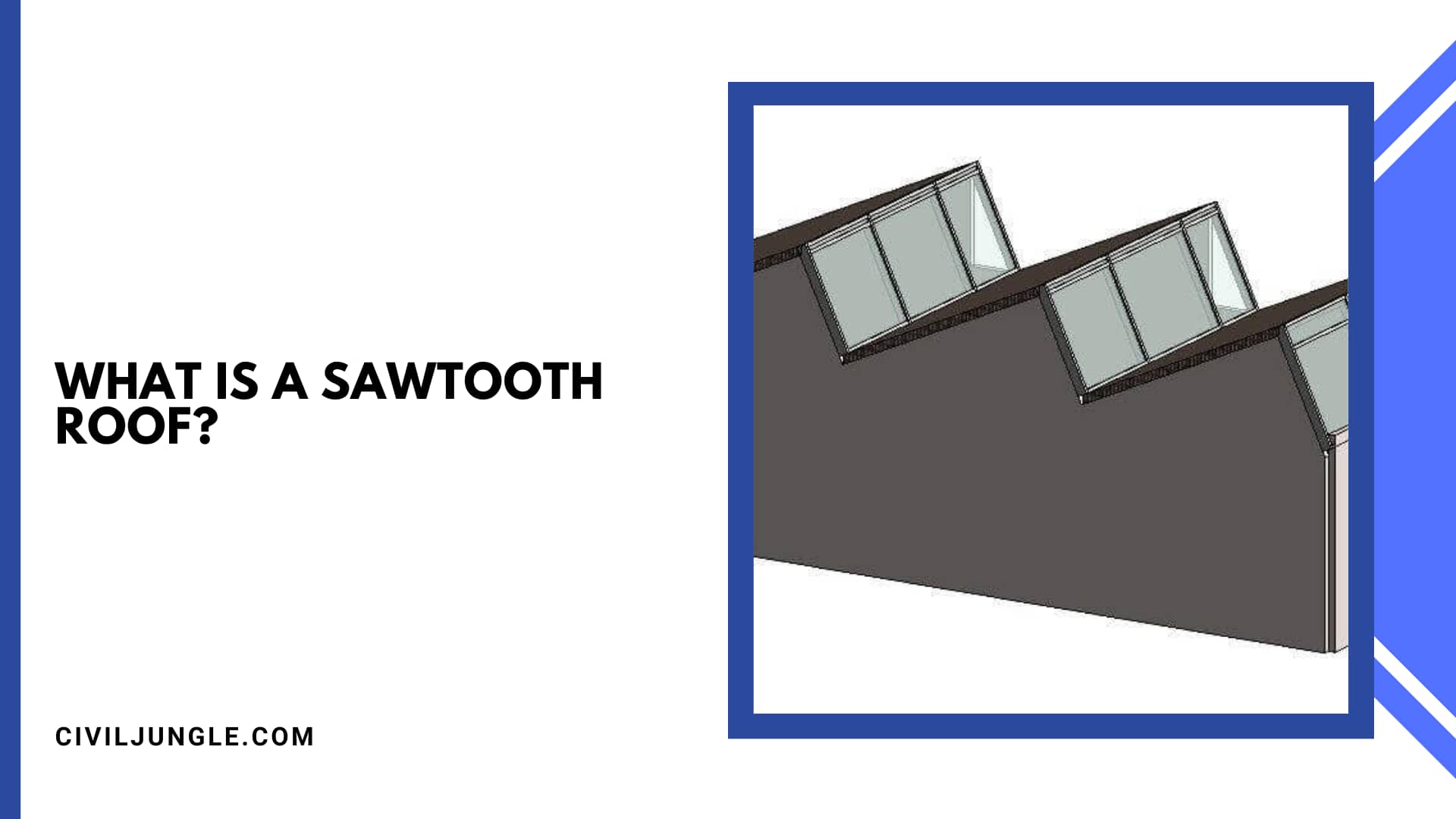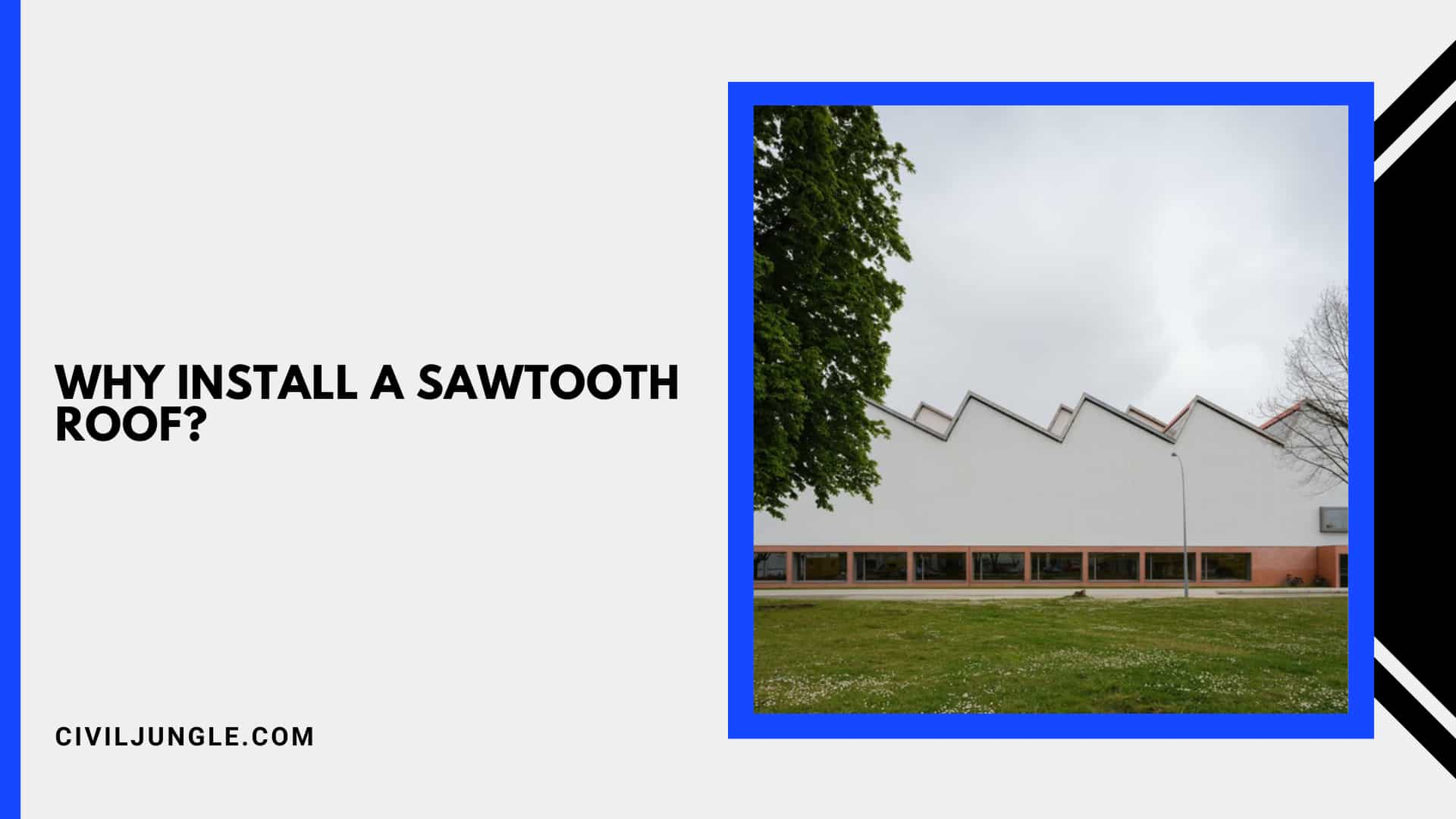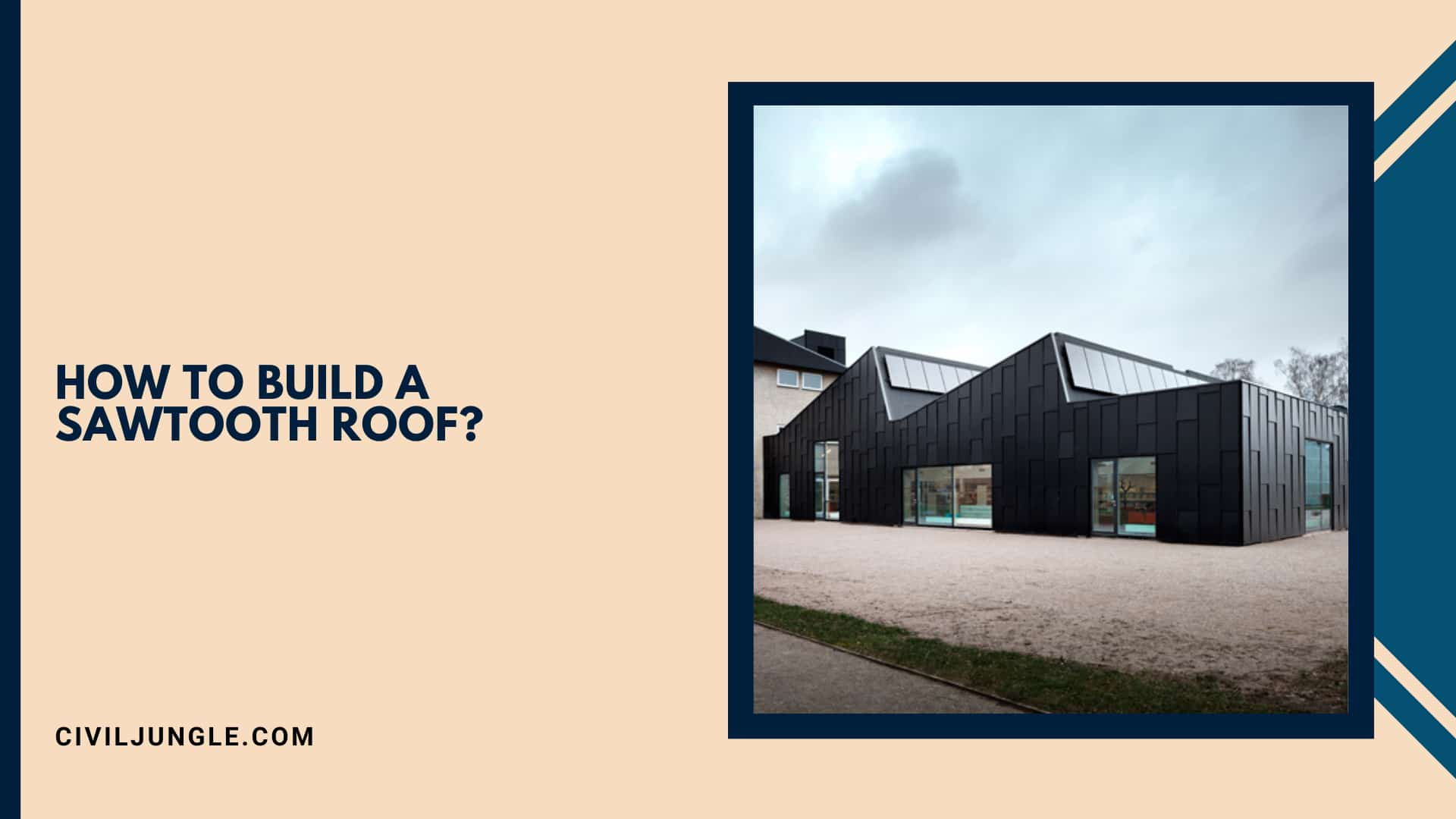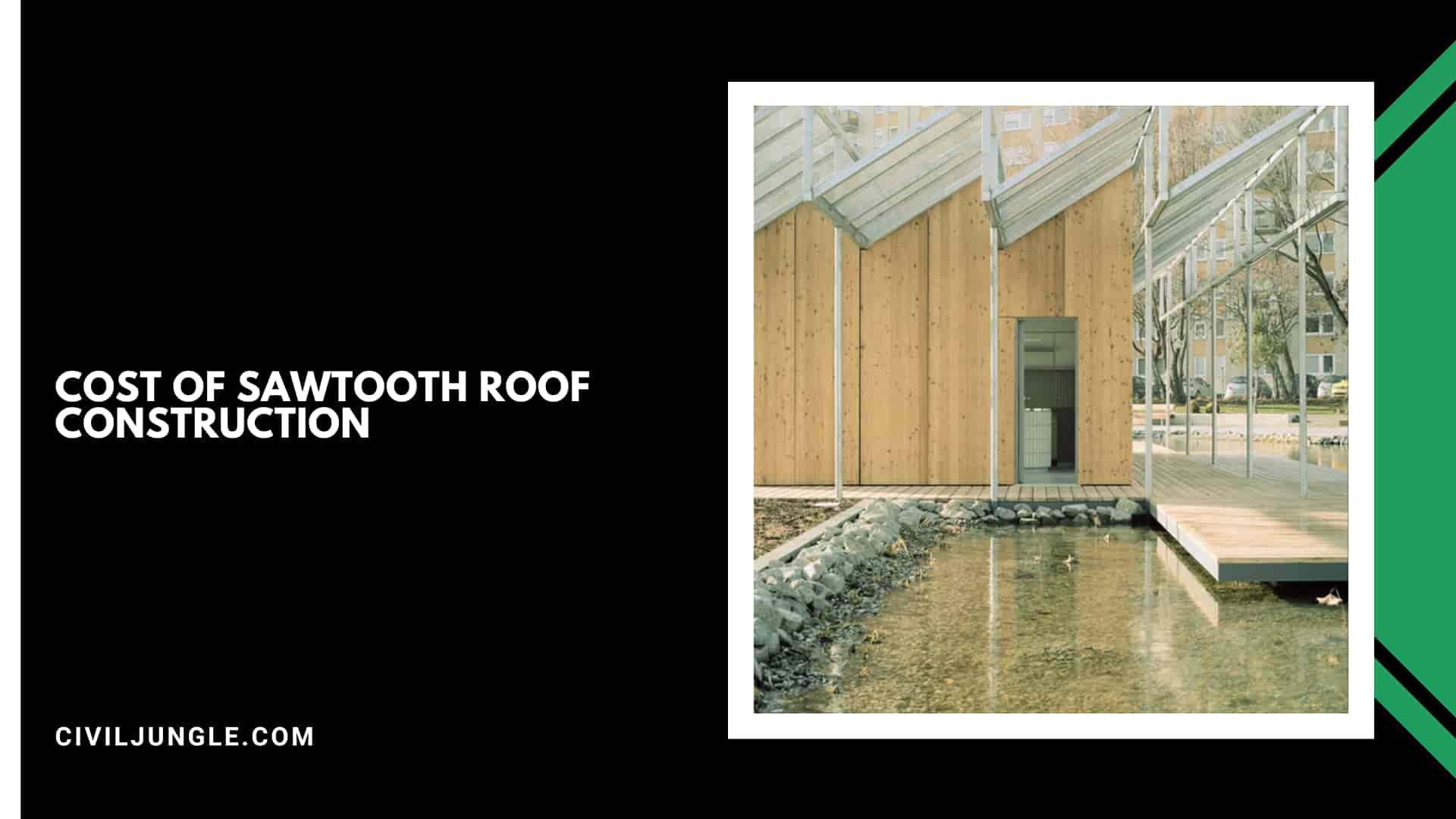The saw-tooth roof was designed by William Fairburn, a British architect and engineer, in 1827. But sawtooth roofing did not gain popularity until the 20th century because they were primarily suited for industrial purposes.
Sawtooth roof factories used to bring natural light into the manufacturing process of factory roofs during the Industrial Revolution.
Sawtooth roof structures look beautiful when constructed in a series of three. Sawtooth roofs have become a popular choice for zig-zag roofs, sawtooth skylights, mills and factory roofing, and residential homes due to their environmentally friendly benefits.
What Is a Sawtooth Roof?
Important Point
The design of a sawtooth roof consists of a series of stripes with a double pitch on both sides. Sawtooth roofs have multiple parallel roofs that look like saw teeth and have one slope higher than the other. This type of roof has high windows for maximum natural light.
Sawtooth roof designs are commonly found in large industrial buildings, and some roofs are similar to skilling roofs. The main purpose behind building this roof is to increase the amount of natural light in the factory.
Factory sawtooth roof aims to prevent outside heat and provide a conducive environment for the workers. The popularity of this type of roof in modern times has gradually increased.
Now Sawtooth Roofing Style is made with various improvements and innovations to suit offices and homes. To improve the cooling efficiency of this type of roof, various inclusive high-tech radiation barriers are installed on the wooden roof.
The lifespan of sawtooth roofs depends on the material used. If you use high-quality, durable materials like slate or fiber cement, it increases the longevity of your roof.
Sawtooth roofs can last up to 75 years depending on the quality of the high-quality, durable material, climate, and construction.
Why Install a Sawtooth Roof?
The sawtooth roof design helps to provide good lighting in the interior. The design of this type of roof is intended to produce positive effects (such as light and warmth) in the building from ‘daylighting’ due to its design giving sunlight to the building and reducing problems such as overheating in the industrial unit.
Sawtooth roof designs have become more popular in energy saving in recent years. In addition, careful planning in the sawtooth roof provides benefits like natural light, passive heat, etc.
In the industrial unit. The sawtooth roof was designed to provide adequate lighting in interior spaces.
The main purpose of this roof design is to use ‘natural daylighting,’ which provides a good environment for employees in various processes in a building or industrial unit. And simultaneously reduces concerns such as heat.
How to Build a Sawtooth Roof?
We have given the information on saw-tooth roof construction detail here. Sawtooth roofs are made from high-strength wood, metal, and concrete materials. It is very important to design the sawtooth roof angle properly.
When constructing this type of roof, you should consider the saw tooth roof dimensions, symmetry, and uniformity of the roof. Beam-in sawtooth roofs have a longer span than any other traditional roof.
This type of roof has a dead load greater than the live weight. Therefore, you should focus on structural reinforcement during the construction of sawtooth roofs.
In constructing this type of roof, builders usually use steel reinforcement as additional support. They install a series of metal trusses on the roof-hinged parts for extra support.
The construction of this type of roof includes a series of valleys and ridges. In addition, a durable wearing coat is used instead of metal or slate asphalt stairs. Which increases the structural dead load of the building
The sawtooth roof angle will always depend on the load it has to carry. A sawtooth roof truss is built in sections, with a shallower slope pitch of 15-25 degrees will be preferred, while the structure of the translucent parts that are steeper has a pitch of 50-70 degrees.
In this type of roof, the composition of each roof section is different. Each saw tooth roof section typically requires a 15-degree inclination. Similarly, the transparent sections of the roof need a 60-degree inclination.
Another important consideration in sawtooth roofs is the roof gutter. When choosing a gutter design, make sure it is strong enough to hold the amount of water on the roof during heavy rains.
If you want to install box gutters in sawtooth roofs, it may require regular maintenance to prevent leaks. The accumulation of leaves in the box gutter causes obstruction inside the gutter.
In sawtooth roofs, you have to decide the minimum amount of space you need under them. Sloping ceilings and skylights are the best options for that. And if the interior space of the roof is open, you can install glass.
The main concern on sawtooth roofs is the possibility of snow accumulation. Because that can lead to potential leaks around your roof window.
The solution to this type of problem is to pitch the roof to the window and install the heating coil at the lower point of the roof.
Also Read: Top 38 Outdoor Patio Roof Ideas
Cost of Sawtooth Roof Construction
Installation of asphalt shingles in sawtooth roofs is the most cost-effective solution. However, it is not a more sustainable option. Asphalt shingles can also increase maintenance costs on peaks and valleys in sawtooth roofs.
Slate shingles sawtooth roofs, as a second option, are more durable and will last longer. But it will cost more. Metal shingles increase their use costs due to their ability to withstand extreme temperatures.
Maintain Sawtooth Roofs
Here are some simple ways to maintain Saw tooth types. Roof detail is:
- Sawtooth Roof should be removed by dealing properly with wet. So that sealing the roof will not spoil it. In this type of roof, the old sealant needs to be completely removed, and dealing with the new sealant needs to be quick.
- The various parts of the roof should be inspected regularly, and preferably a wire brush should be rubbed against the metal surface to prevent corrosion.
- Trees around your home should be trimmed periodically. And remove falling leaves from the roof. Moisture that holds the mold in the gutter and increases the chances of rot.
Also Read: Top 38 Patio Roof Options
Saw Tooth Roof Advantages and Disadvantages
Some of the sawtooth roof pros and cons are:
Advantages of Sawtooth Roofs
Some of the sawtooth roof pros are:
- Energy Saving: Properly designed and built, a sawtooth roof can help you save money on heating and cooling in your home. Because it keeps your home warm in winter and cool in summer against different weather.
- Natural Light: Sawtooth ceilings include glass panels. Which helps to provide maximum natural light in the interior. It also blocks the sun’s harmful UV rays. So the use of this roof is becoming very popular for factories. Sawtooth roofs can be easily installed with solar panels. So that producing zero carbon footprint since working on solar energy.
- Versatile Roofing: Sawtooth ceilings can be easily resized and sized into the desired design. Hence it is also known as the versatile roof. Many applications can be easily installed near the Sawtooth roof. This type of roof is also referred to as a multi-purpose roof by some builders as it can be used for commercial roofs of houses and also for industrial roofs and garage roofs etc.
- Solar Panels: You can get natural energy benefits by simply installing solar panels on sawtooth roofs. Sawtooth roofing is an environmentally friendly solution that can help homeowners save money on electricity costs.
- High Ceilings: Sawtooth roofs allow more efficient use of headroom and floor space. It is easy to install beams, columns, and attractive elevations in the roof design. Sawtooth roofs provide maximum headroom compared to flat roofs. The limited height of the room can be obtained due to the length of the interior walls in the traditional ceiling.
- Installation: Sawtooth can be easily installed at the height of up to 18 meters for a roof in general. But it can be customized in a single day at an altitude of more than 20 meters with additional cost to speed up the installation.
- Unique Roof Design: Sawtooth roofs are beneficial in easily improving the appearance of any building structure. Glazing can be fitted with solar panels on sawtooth roofs. Which allows proper fitting of natural light. Which also enhances the look of the building.
- Option: Sawtooth Roofs are a great option for architects to transform into beautiful roof spaces that require minimum maintenance.
Install on High-Rise Buildings: Sawtooth roofs are able to withstand higher weights and the loads accumulated on them than conventional roofs in high-rise buildings. But a traditional roof can carry a limited load, so it is safer.
Also Read: Top 40 Patio Roof Ideas
Disadvantages of Sawtooth Roofs
Some of the sawtooth roof cons are:
- Not Suitable for Heavy Snowfall: The construction of sawtooth roofs involves many valleys, slopes, and windows. Therefore, there is a risk of leakage during heavy rains or snowfall. Therefore, if its use is appropriate in an arid region.
- Expensive to Construction: Due to its complex design, it requires various materials through proper planning. Sawtooth roofs cost more to make than other traditional roofs. For this type of roof, you will also need a suitable designer architect, which increases the cost of sawtooth roofs.
- The durability of Sawtooth Roof: Sawtooth roofs are compromised in different parts to reduce the roof’s weight. The effect of which naturally falls on the Sawtooth roofs. Therefore its risks damage and maintenance problems.
- High Maintenance: This type of roof is prone to corrosion due to trapped water. This is because most of the metal sheets are used in different parts of this type of roof. This makes the actual design of the roof susceptible to leakage into the existing glass.
- Lifespan: Consequently, it is advisable to use high-quality roofing materials that can withstand adverse weather conditions. It is important to take care of sawtooth roofs periodically to increase their lifespan and efficiency.
- Sawtooth Roof Orientation: The diagonal shape of sawtooth roofs can interfere with the view of nearby houses and buildings. However, since the materials used are transparent, there is more space and less obstruction for people living near sawtooth roofs.
Conclusion
Sawtooth roofs offer a beautiful look with a variety of glass panels. It blocks UV rays in large spaces and is able to invite natural light. This roof is especially suitable for use in factories.
If you decide to build this type of roof, you should consider the position of the sawtooth windows to get the most natural light in your space.
Like this post? Share it with your friends!
Suggested Read –
- What Is a Slate Roof?
- What are Roofing Shingles?
- What Is Modified Bitumen Roof?
- What Is Pipe Fittings And Their Types
- Engineered Wood Flooring for Basement
What Is a Sawtooth Roof?
A sawtooth roof consists of a series of parallel roof sections with alternating slopes that resemble the teeth of a saw. The design typically includes high vertical windows on the steeper slopes to allow natural light into the building.
Who Invented the Sawtooth Roof?
The sawtooth roof was designed by British architect and engineer William Fairburn in 1827.
Why Did Sawtooth Roofs Gain Popularity in the 20th Century?
Sawtooth roofs gained popularity in the 20th century due to their effectiveness in bringing natural light into industrial buildings, which improved working conditions and productivity in factories during the Industrial Revolution.





Leave a Reply